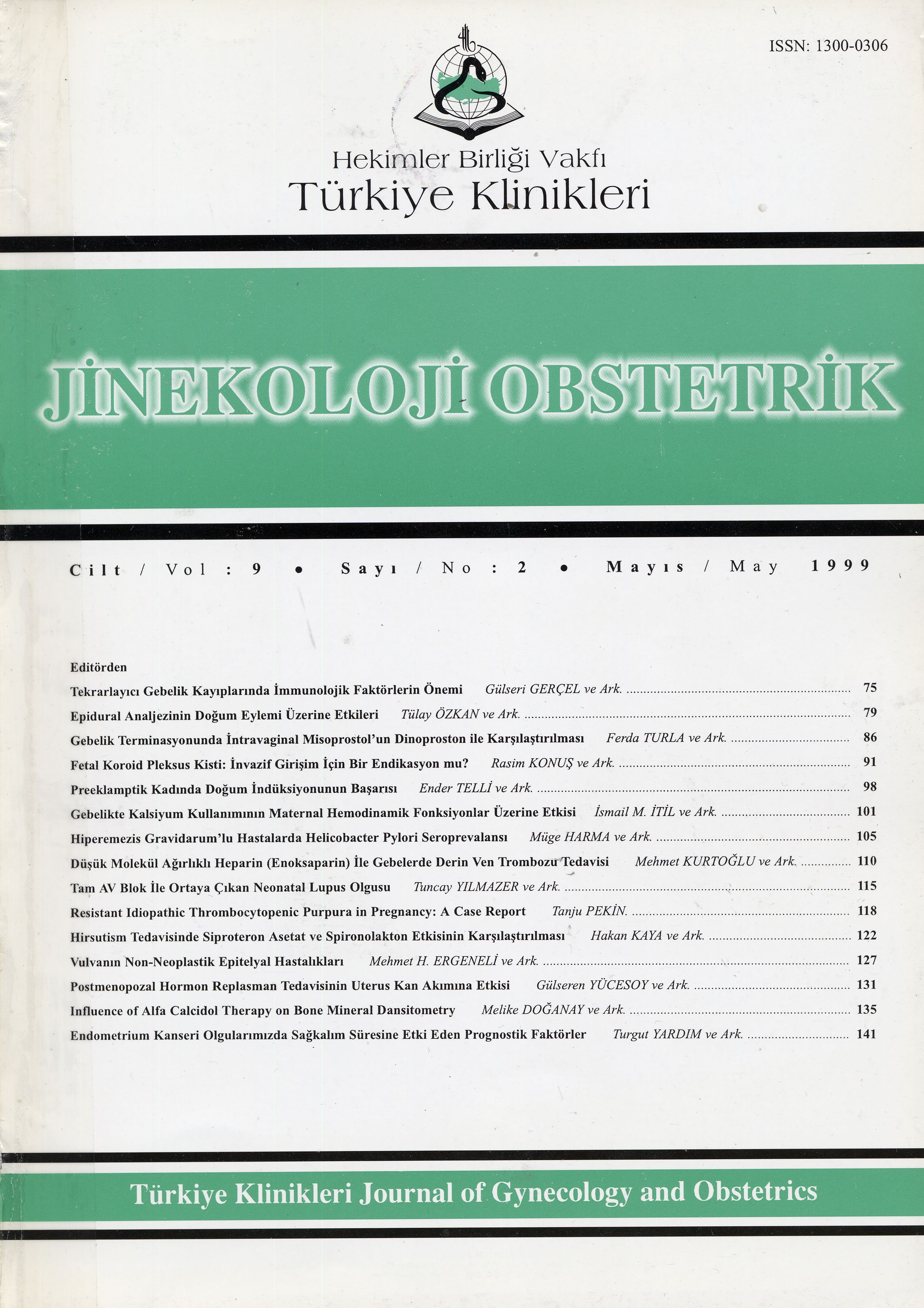Open Access
Peer Reviewed
ARTICLES
3396 Viewed1372 Downloaded
Vulvar Non-Neoplastic Epithelial Disorders
Vulvanın Non-Neoplastik Epitelyal Hastalıkları
Turkiye Klinikleri J Gynecol Obst. 1999;9(2):127-30
Article Language: TR
Copyright Ⓒ 2025 by Türkiye Klinikleri. This is an open access article under the CC BY-NC-ND license (http://creativecommons.org/licenses/by-nc-nd/4.0/)
ÖZET
Amaç: Vulvanın nonneoplastik epitelyal hastalıklarında tıbbi tedavi yöntemlerini değerlendirmek Çalışmanın yapıldığı yer: Başkent Üniversitesi Tıp Fakültesi, Kadın hastalıkları ve Doğum Anabilim Dalı. Materyel ve Metod: Ocak 1995 ile Mayıs 1998 tarihleri arasında başvurup vulvanın nonneoplastik epitelyal hastalığı tesbit edilen hastaların tedaviye verdikleri cevaplar retrospektif olarak incelenmiştir. Bulgular: Vulvanın nonneoplastik epitelyal hastalığı olguların %1.1inde tesbit edilmiştir. Yüzde ikilik testosteron propionat ile tedavi edilen 15 liken sklerosus olgusundan 11 tanesinde (%73) tam cevap, bir tanesinde (%7) kısmi cevap, 3 tanesinde (%20) cevapsızlık gözlenmiştir. Tam cevap alınamayan hastalar %0.05lik klobetazol propionat ile tedavi edilebilmiştir. Skuamöz hücre hiperplazisi saptanan 51 hastanın 49 tanesinde (%96) %0.1lik betametazon valerat kullanılarak tam cevap, 2 tanesinde (%4) kısmi cevap elde edilmiştir. Kısmi cevap alınanlarda %0.05lik klobetazol propionat tam tedaviyi sağlamıştır. Sonuç: Vulvanın nonneoplastik epitelyal hastalıkları kortikosteroid etkili topikal ilaçlarla başarıyla tedavi edilebilir.
Amaç: Vulvanın nonneoplastik epitelyal hastalıklarında tıbbi tedavi yöntemlerini değerlendirmek Çalışmanın yapıldığı yer: Başkent Üniversitesi Tıp Fakültesi, Kadın hastalıkları ve Doğum Anabilim Dalı. Materyel ve Metod: Ocak 1995 ile Mayıs 1998 tarihleri arasında başvurup vulvanın nonneoplastik epitelyal hastalığı tesbit edilen hastaların tedaviye verdikleri cevaplar retrospektif olarak incelenmiştir. Bulgular: Vulvanın nonneoplastik epitelyal hastalığı olguların %1.1inde tesbit edilmiştir. Yüzde ikilik testosteron propionat ile tedavi edilen 15 liken sklerosus olgusundan 11 tanesinde (%73) tam cevap, bir tanesinde (%7) kısmi cevap, 3 tanesinde (%20) cevapsızlık gözlenmiştir. Tam cevap alınamayan hastalar %0.05lik klobetazol propionat ile tedavi edilebilmiştir. Skuamöz hücre hiperplazisi saptanan 51 hastanın 49 tanesinde (%96) %0.1lik betametazon valerat kullanılarak tam cevap, 2 tanesinde (%4) kısmi cevap elde edilmiştir. Kısmi cevap alınanlarda %0.05lik klobetazol propionat tam tedaviyi sağlamıştır. Sonuç: Vulvanın nonneoplastik epitelyal hastalıkları kortikosteroid etkili topikal ilaçlarla başarıyla tedavi edilebilir.
ABSTRACT
Objective: To evaluate the medical treatment modalities for vulvar nonneoplastic epithelial disorders. Institution: Başkent University, School of Medicine, Department of Obstetrics and Gynecology. Materials and methods: Patients who were detected to have vulvar nonneoplastic epithelial disorders between January 1995 and May 1998 were investigated retrospectively. Results: Of 15 patients with lichen sclerosus who were treated with topical 2% testosterone propionate, complete response was achieved in 11 patients (73%), partial response in one (7%), and no response in 3 (20%) patients. All patients with partial or no response were successfully treated with 0.05% clobetasole propionate. Fifty one patients with squamous cell hyperplasia were treated with 0.1% betamethasone valerate; complete response was achieved in 49 (96%) and partial response in 2 (4%) patients, while 0.05% clobetasole propionate successfully treated patients with partial response to the other steroid. Conclusion: Medical measures with topical steroids can effectively treat vulvar nonneoplastic epithelial disorders.
Objective: To evaluate the medical treatment modalities for vulvar nonneoplastic epithelial disorders. Institution: Başkent University, School of Medicine, Department of Obstetrics and Gynecology. Materials and methods: Patients who were detected to have vulvar nonneoplastic epithelial disorders between January 1995 and May 1998 were investigated retrospectively. Results: Of 15 patients with lichen sclerosus who were treated with topical 2% testosterone propionate, complete response was achieved in 11 patients (73%), partial response in one (7%), and no response in 3 (20%) patients. All patients with partial or no response were successfully treated with 0.05% clobetasole propionate. Fifty one patients with squamous cell hyperplasia were treated with 0.1% betamethasone valerate; complete response was achieved in 49 (96%) and partial response in 2 (4%) patients, while 0.05% clobetasole propionate successfully treated patients with partial response to the other steroid. Conclusion: Medical measures with topical steroids can effectively treat vulvar nonneoplastic epithelial disorders.
MENU
POPULAR ARTICLES
MOST DOWNLOADED ARTICLES





This journal is licensed under a Creative Commons Attribution-NonCommercial-NoDerivatives 4.0 International License.










